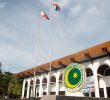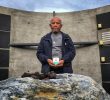Cites unresolved issues of rights violation in previous Balikatan
The Moro partylist organization Suara Bangsamoro calls for the government to stop the holding of Balikatan in Sulu and Basilan slated on February this year, says that previous Balikatan held in the two provinces have left issues of human rights violations still unresolved.
According to Amirah Ali Lidasan, national president of Suara Bangsamoro (Voice of the Moro People), American officials and their soldiers should be made answerable to the complaints made by civilians against the US soldiers.
�The government should look into the complaints against US soldiers who issued an order at a hospital chief in Panamao, Sulu to shut down hospital operations at night,� said Lidasan.
Lidasan complained at the brazen display of might by the US soldiers, even in non-combatant areas. Lidasan cited a recent case in Zamboanga City where passengers of a tricycle complained in a radio station about US soldiers who accidentally bumped the tricycle they were riding in Calarian village on December 15, 2007. Instead of helping the victims to get up, US soldiers got down from their vehicle complete with high-powered guns that according to the complainants looked like they were going to war.
�Ordinary citizens of Mindanao have been exposed to the impertinent attitudes of the US soldiers, and this is aggravated if government officials do not act on it,� said Lidasan.
Lidasan praised Saranggani Gov. Miguel �Migz� Dominguez, however, for apprehending US soldiers who were seen at a local fast food establishment in uniform and �prominently displayed� their firearms which according to Dominguez is a violation to our laws.
Lidasan fear that should these cases continue to be unresolved, the civilians in designated Balikatan areas will be more vulnerable to the presence of US troops.
�It is a pain for the victims of Balikatan to learn that their complaints have fallen on deaf ears as the government gave a go-signal to commence the Balikatan exercises in their areas despite of the unresolved cases of human rights violations that involved US soldiers,� said Lidasan.
Among the cases cited by Lidasan was the shooting and wounding of Buyung-Buyung Isnijal allegedly by an American soldier identified by witnesses as a certain Sgt. Reggie Lane, who was accused of participating in a military operation on July 27, 2002 in Tuburan, Basilan.
The involvement of an American soldier in combat operations is a violation to the Terms of Reference under the Visiting Forces Agreement, an agreement between the US and Philippine Armed Forces in defining and limiting the conduct of the joint military exercises.
Another case was the reported involvement of US soldiers in a combat operation that happened in a camp of the chair of the Moro National Liberation Front based in Sulu, Sulu State Chairman Khaid Ajibon.
Lidasan said that the case caused a congressional inquiry by the Committee on Peace and Reconcilliation and several witnesses came forward and revealed the involvement of US troops during a military operation that affected the camp of MNLF chair Ajibon on November 2005.
According to Lidasan, the incident has infuriated the people of Sulu and caused massive protests in Jolo in 2006.
Lidasan also cited cases of shooting and maiming of civilians purportedly by US soldiers who accidentally fired at civilians in the community while on their testing missions. One case was the shooting and wounding of Arsid Baharun in Zamboanga City while soldiers were conducting a marksmanship practice in 2004, and the second was in September 2006 where shrapnels of a misfired bomb hit the back of a 50-year old mother Bizma Juhan in Indanan, Sulu.
Lidasan fear the vulnerability of the Moro civilians in areas where Balikatans are held. Previous statements made by US officials on having the right to carry guns and fire at people whom they think will compromise their security absolves them of these crimes.
Lidasan also criticize the way these cases were considered �resolved� by the US soldiers and the Armed Forces of the Philippines by making the victims �settle� with the US forces by accepting money for their medical treatment or by accusing the victims of being an Abu Sayyaf member.#










